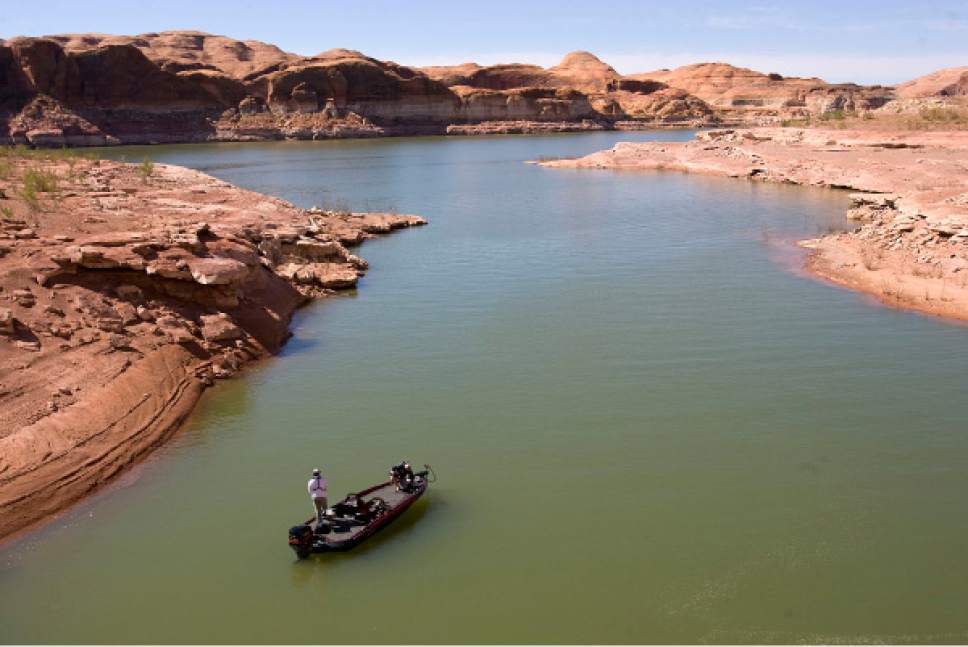This is an archived article that was published on sltrib.com in 2017, and information in the article may be outdated. It is provided only for personal research purposes and may not be reprinted.
Utah's congressional delegation hopes President Donald Trump's interest in infrastructure will help make the controversial Lake Powell Pipeline a reality a little sooner.
Members have asked the president to make the pipeline a "high priority" and to expedite the project's environmental reviews and approvals — making the request before the state has finished its application to the Federal Energy Regulatory Commission (FERC) for permission to build it.
"As one of the largest water infrastructure projects in Utah, the [Lake Powell Pipeline] will provide much-needed jobs and business opportunities for Utah companies, while contributing millions of dollars to the local economy," said the delegation's letter, from Sens. Orrin Hatch and Mike Lee and Reps. Chris Stewart, Rob Bishop, Jason Chaffetz and Mia Love.
The letter to the White House was dated March 23; a copy was stamped as received by the FERC on June 12.
Conn Carroll, a spokesman for Lee, said the delegation felt it was necessary to request expedited treatment to limit the length of the review period once Utah's application is complete.
Environmental reviews, he said, can be "a lengthy process and often stretch out years, so even though the application is not finished, it was still deemed necessary to put it on the radar of the Trump administration."
He said he was not aware of any response from the White House. And, he said, he was not sure how the letter to the White House got to FERC.
Utah Gov. Gary Herbert wrote a similar letter to the White House Council on Environmental Quality in February, and his letter also was later sent to FERC. The governor's office did not comment on his letter Wednesday.
According to the letter, the pipeline will cost about $1.4 billion to construct, but will generate an economic return of $1.5 billion and $19 billion in sales tax. The delegation also asserts that the pipeline will provide water for about 250,000 current and future residents in a region where demand for water will outstrip supply by 2030.
"The environmental review process has taken 10 years and cost $32 million," they wrote, an apparent reference to work done by the state of Utah to prepare its submission to FERC.
"It is imperative that the review process be completed by 2018, which will require permitting and completed environmental review from FERC, the Bureau of Land Management, the National Park Service, the Army Corps of Engineers, and the Bureau of Reclamation," the letter said.
Carroll said the delegation asked for the 2018 deadline because one year for an environmental review seemed like a reasonable amount of time.
Zach Frankel, executive director of the Utah Rivers Council and a vocal opponent of the pipeline, was quick to point out the irony of the request. "Left out of the letter is the fact that the Utah agency proposing the pipeline has requested three extensions of time from the FERC to delay permitting because of concerns about whether the project is needed," he said in a statement.
Utah's Division of Water Resources submitted a project application to the FERC in May 2016. However, shortly after filing it, the division said the 6,000-page document contained numerous errors and would require revision.
The state has filed supplementary material revising the application in the year since it was initially submitted and that process is not yet complete, it said Wednesday.
Josh Palmer, a spokesman for the division, said there is as of yet no projected date for the pipeline's groundbreaking because it's not clear how much longer it will take to finish the application paperwork.
"While there has been progress, the division is focused on ensuring all of the required paperwork and processes are carried out according to federal statute," he said in a statement. "We will continue to work with Federal and project partners, as well as the public and interested stakeholders, as the process moves forward."
A hydroelectric generation component of the pipeline proposal brings the project under FERC purview. Should the commission approve the project, it is anticipated that the FERC would use the Lake Powell Pipeline License Application to generate the paperwork necessary to request other environmental permits.
The Division of Water resources has proposed using the Lake Powell Pipeline to pump 86,249 acre-feet of water 140 miles from Lake Powell to St. George. According to the state delegation's letter, this will "allow the State of Utah to use its legally-allocated portion of the Colorado River."
Twitter: @EmaPen



